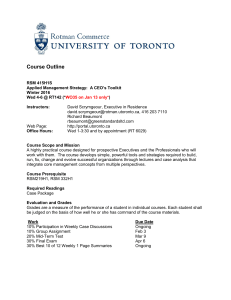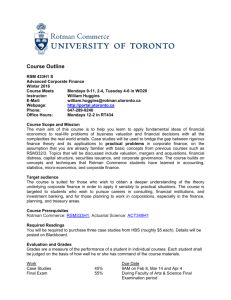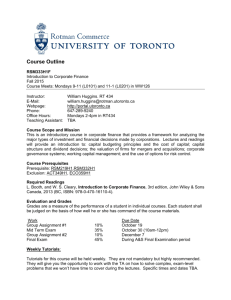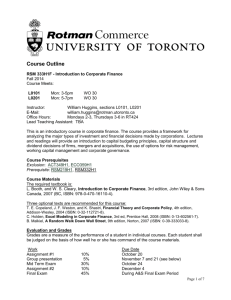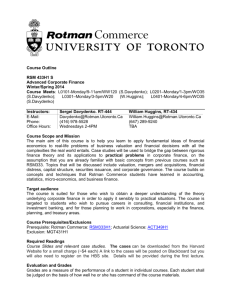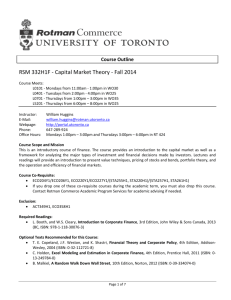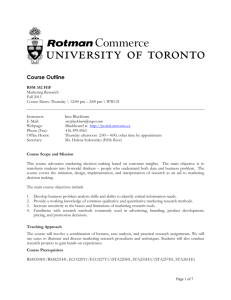RSM434 Financial Trading Strategies Course Outline
advertisement
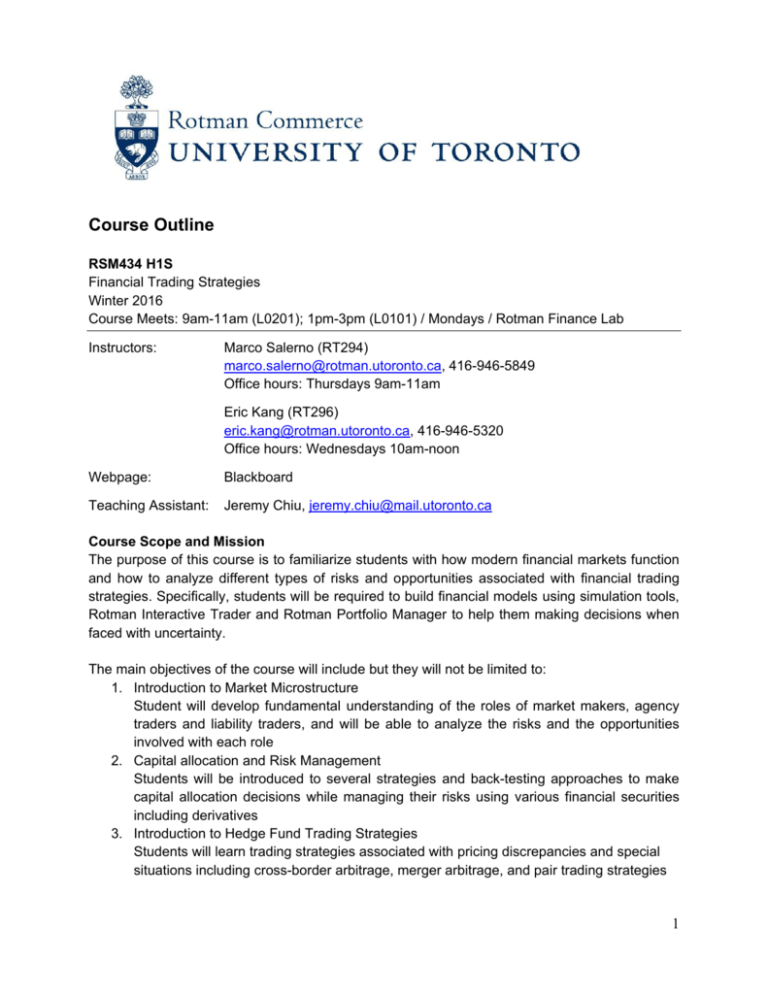
Course Outline RSM434 H1S Financial Trading Strategies Winter 2016 Course Meets: 9am-11am (L0201); 1pm-3pm (L0101) / Mondays / Rotman Finance Lab Instructors: Marco Salerno (RT294) marco.salerno@rotman.utoronto.ca, 416-946-5849 Office hours: Thursdays 9am-11am Eric Kang (RT296) eric.kang@rotman.utoronto.ca, 416-946-5320 Office hours: Wednesdays 10am-noon Webpage: Blackboard Teaching Assistant: Jeremy Chiu, jeremy.chiu@mail.utoronto.ca Course Scope and Mission The purpose of this course is to familiarize students with how modern financial markets function and how to analyze different types of risks and opportunities associated with financial trading strategies. Specifically, students will be required to build financial models using simulation tools, Rotman Interactive Trader and Rotman Portfolio Manager to help them making decisions when faced with uncertainty. The main objectives of the course will include but they will not be limited to: 1. Introduction to Market Microstructure Student will develop fundamental understanding of the roles of market makers, agency traders and liability traders, and will be able to analyze the risks and the opportunities involved with each role 2. Capital allocation and Risk Management Students will be introduced to several strategies and back-testing approaches to make capital allocation decisions while managing their risks using various financial securities including derivatives 3. Introduction to Hedge Fund Trading Strategies Students will learn trading strategies associated with pricing discrepancies and special situations including cross-border arbitrage, merger arbitrage, and pair trading strategies 1 Students will constantly be asked to apply their critical thinking to analyze the problems presented using the Rotman Interactive Trader cases. They will also be required to translate their thinking into financial models that will support them in making real-time decision decisions. Rotman Interactive Trader The Rotman Interactive Trader is a market-simulator that provides students with a hands-on approach to learning finance. It allows students to practice decision making under uncertainty in a controlled environment where they can immediately observe the outcomes of their decisions. By being able to analyze the consequences of their decisions in different situations, students are able to learn how to make good decisions when the future is uncertain. More information can be found at http://rit.rotman.utoronto.ca. Rotman Portfolio Manager Rotman Portfolio Manager (RPM) exercises will be assigned to apply your strategies to real-time quotes for actual securities. This facilitates learning about important institutional details and reinforces the learning objectives of the RIT cases. You will be able to install the RPM client and connect to the RPM server from any computer with a web connection. More information can be found at http://rpm.rotman.utoronto.ca. Course Prerequisite: RSM332H1 Course Exclusions: RSM412H1 – Financial Trading Strategies Required Readings There is no textbook for this course. Slides, RIT Case Briefs, Excel support templates, help files, and any other materials will be posted on the course webpage. It is required that students read the case studies prior to attending each class. An RPM subscription is required http://rpm.rotman.utoronto.ca. Optional Readings Optional Reading will be posted on the course webpage and will be noted as optional. Any reading that is not noted as Optional has to be considered required. Group Assignment: Group Assignment involves learning how to use VBA to develop an algorithm to implement particular trading strategies. RIT Performance Evaluations: Score will be based on your average rank across several replications of the RIT cases. RPM Exercises: These short exercises will show you how to apply the lessons we learn from simulation to realtime quotes for actual securities. They are due prior to class the week after assigned. Midterm Quiz and Final Test: Q&A and discussions at the start of classes will be excellent preparation for the questions on the tests. 2 Weekly Schedule Class Date January 11th Topic Readings and Deliverables Introduction to the course RPM Tutorial Review of risks and returns RIT Video & Feature Guide RPM Guides and Videos January 18th Order Driven Markets RIT Agency Trading 1 & 2 January 25th Liquidity Risk RIT Liability Trading 2 & 3 RPM VWAP Exercise February 1st February 8th RIT Liability Trading 4 & ALGO 1 Multiple Venues and Cross-Listed Arbitrages RIT VBA API Documentation RPM Cross-Listed Arbitrage Exercise Midterm Quiz Price Discovery in Equity Markets RIT Price Discovery 0 RIT Equity Valuation 1 February 22nd February 29th RIT Options Trading 1 Hedging using Options: Portfolio Insurance RIT Hedging 2 RIT Futures 2 RIT Agricultural Hedging 1 RPM Portfolio Insurance Exercise Hedging using Futures: Price & Production Risk Group Assignment due March 7th RIT Portfolio Management 1 Capital Allocation decisions and Managing Risk RIT Value-at-Risk RPM Commodity Hedging Exercise March 14th Portfolio Analysis and Back-testing In-class Exercise March 21st Hedge Fund Trading Strategies RIT Merger Arbitrage 1 March 28th Performance Evaluation and Review April 4th LT4 Performance Evaluation VaR Performance Evaluation Final Test Dates of Deliverables Due to the continuous development of new cases, the above schedule is subject to change and students will be given a one-week notice if the case sequence changes. 3 Evaluation and Grades Grades are a measure of the performance of a student in individual courses. Each student shall be judged on the basis of how well he or she has command of the course materials. Work RPM Exercises (4 x 3 marks) Performance Evaluations (2 x 10marks) Group Assignment Midterm Quiz Final Test Mark 12 marks 20 marks 20 marks 18 marks 30 marks Due Date Jan 25th, Feb 1st, Feb 29th & Mar 7th March 28th February 29th February 8th April 4th COURSE FORMAT AND EXPECTATIONS Assignment, Midterm Quiz and Final Test: You must hand in a hard copy of your group assignment report that has an executive summary and is self- contained, that is, has tables, figures, etc., integrated into the text. Please note that clear, concise, and correct writing will be considered in the evaluation of your work including Group Assignment, Midterm Quiz, and Final Test. That is, you may lose points for writing that impedes communication: poor organization, weak paragraph development, excessive wordiness, hard-to-follow sentence structure, spelling mistakes and grammatical errors. Students who require additional support and/or tutoring with respect to their writing skills are encouraged to visit the Academic Success Centre (www.asc.utoronto.ca) or one of the College Writing Centres (www.writing.utoronto.ca/writing-centres). These centres are teaching facilities – not editing services, where trained staff can assist students in developing their academic writing skills. There is no charge for the instruction and support. For Group Assignment: Learning to work together in teams is an important aspect of your education and preparation for your future careers. That said, project-based teamwork is often new to students; to work well in teams, it helps to follow a set of core expectations to best succeed at your team projects. 1. Read the document entitled, “Working in Teams: Guidelines for Rotman Commerce Students” which is available on the RC portal under the Academic Services tab. 2. When working in a team, Rotman Commerce students are expected to: Treat other members with courtesy and respect; Honour the ground rules established by the team; Contribute substantially and proportionally to the final project; Ensure enough familiarity with the entire contents of the group project/assignment so as to be able to sign off on it as original work; Meet the project timeline as established by the team. 4 3. Resolving conflicts: Conflicts are part of the team’s process of learning how to work together. When handled well, it can generate creativity and bring-multiple perspectives to the solution. Student teams are expected to work through their misunderstandings as soon as they arise (and prior to submission of the final project). When teams are unable to arrive at a solution that works for all members, the team must meet with the Rotman Commerce Team Coach** as soon as possible. The Coach will listen to the team and help develop options for improving the team process. All members of the project team must commit to, and, utilize their action plans. ** For an appointment with a Rotman Commerce Team Coach, please contact Elaine Zapotoczny at elaine@nikoletaandassociates.com. Elaine is highly skilled at facilitating team dynamics and collaboration. Note that the Team Coach’s role is to provide guidance, support and advice on team matters – not to formally evaluate or assess teamwork for academic purposes. POLICY AND PROCEDURE Missed Tests and Assignments (including midterm examinations) Students who miss a test or assignment for reasons entirely beyond their control (e.g. illness) may submit a request for special consideration. Provided that notification and documentation are provided in a timely manner, and that the request is subsequently approved, no academic penalty will be applied and the corresponding weight(s) of the missed test and/or assignments will be allocated to the final test. In such cases, students must notify Rotman Commerce on the date of the missed test (or due date in the case of course work) and submit supporting documentation (e.g. Verification of Student Illness or Injury form) to the Rotman Commerce Program Office within 48 hours of the originally scheduled test or due date. Students who do not provide Rotman Commerce or the instructor with appropriate or sufficient supporting documentation will be given a grade of 0 (zero) for the missed test or course deliverable. Note that the physician’s report must establish that the patient was examined and diagnosed at the time of illness, not after the fact. Rotman Commerce will not accept a statement that merely confirms a report of illness made by the student and documented by the physician. Late Assignments Assignments are due at the beginning of class on the date specified in the course outline. Late submissions will normally be penalized by 10% if the assignment is not received on the specified date, at the specified time. A further penalty of 10% will be applied to each subsequent day. Students who, for reasons beyond their control, are unable to submit an assignment by its deadline must obtain approval from the instructor prior to the due date for an extension. Supporting documentation will be required as per the policy on missed tests and assignments. 5 Accessibility Needs The University of Toronto is committed to accessibility. If you require accommodations for a disability, or have any accessibility concerns about the course, the classroom or course materials, please contact Accessibility Services as soon as possible: accessibility.services@utoronto.ca or http://www.accessibility.utoronto.ca/. Academic Integrity Academic Integrity is a fundamental value essential to the pursuit of learning and scholarships at the University of Toronto. Participating honestly, respectively, responsibly, and fairly in this academic community ensures that the UofT degree that you earn will continue to be valued and respected as a true signifier of a student's individual work and academic achievement. As a result, the University treats cases of academic misconduct very seriously. The University of Toronto’s Code of Behaviour on Academic Matters http://www.governingcouncil.utoronto.ca/policies/behaveac.htm outlines the behaviours that constitute academic misconduct, the process for addressing academic offences, and the penalties that may be imposed. You are expected to be familiar with the contents of this document. Potential offences include, but are not limited to: In papers and assignments: Using someone else's ideas or words without appropriate acknowledgement. Submitting your own work in more than one course without the permission of the instructor. Making up sources or facts. Obtaining or providing unauthorized assistance on any assignment (this includes collaborating with others on assignments that are supposed to be completed individually). On test and exams: Using or possessing any unauthorized aid, including a cell phone. Looking at someone else's answers Misrepresenting your identity. Submitting an altered test for re-grading. Misrepresentation: Falsifying institutional documents or grades. Falsifying or altering any documentation required by the University, including (but not limited to), medical notes. All suspected cases of academic dishonesty will be investigated by the following procedures outlined in the Code of Behaviour on Academic Matters. If you have any question about what is or is not permitted in the course, please do not hesitate to contact the course instructor. If you have any questions about appropriate research and citation methods, you are expected to seek out additional information from the instructor or other UofT resources such as College Writing Centres or the Academic Success Centre. 6 Email At times, the course instructor may decide to communicate important course information by email. As such, all UofT students are required to have a valid UTmail+ email address. You are responsible for ensuring that your UTmail+ email address is set up AND properly entered on the ROSI system. For more information please visit http://help.ic.utoronto.ca/category/3/utmail.html Forwarding your utoronto.ca email to a Hotmail, Gmail, Yahoo or other type of email account is not advisable. In some cases, messages from utoronto.ca addresses sent to Hotmail, Gmail or Yahoo accounts are filtered as junk mail, which means that important messages from your course instructor may end up in your spam or junk mail folder. Blackboard and the Course Page The online course page for this course is accessed through Blackboard. To access the course page, go to the UofT Portal login at https://portal.utoronto.ca/ and log in using your UTORid and password. Once you have logged in, look for the My Courses module where you’ll find the link to all your course websites. If you don’t see the course listed here but you are properly registered for the course in ROSI, wait 48 hours. If the course does not appear, go to the Information Commons Help Desk in Robarts Library, 1st floor, for help, or explore the Portal Information and Help at http://www.portalinfo.utoronto.ca/content/information-students and review the Frequently Asked Questions. Recording Lectures Lectures and course materials prepared by the instructor are considered by the University to be an instructor’s intellectual property covered by the Canadian Copyright Act. Students wishing to record a lecture or other course material in any way are required to ask the instructor’s explicit permission, and may not do so unless permission is granted (note: students who have been previously granted permission to record lectures as an accommodation for a disability are, of course, excepted). This includes tape recording, filming, photographing PowerPoint slides, Blackboard materials, etc. If permission is granted by the instructor (or via Accessibility Services), it is intended for the individual student’s own study purposes and does not include permission to “publish” them in anyway. It is absolutely forbidden for a student to publish an instructor’s notes to a website or sell them in any other form without formal permission. 7
